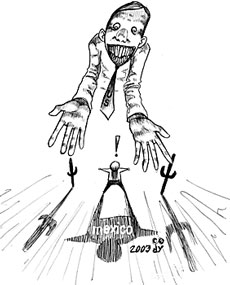
Illustration by Cody Angell
|
By Steve Campbell
Arizona Daily Wildcat
Tuesday March 4, 2003
Being born in this great country provides many people with opportunities that others may only dream of. But does that make a United States citizen more important than someone in Mexico? Or is the life of an American worker more important than that of a Mexican farmer?
So why is it that so many Americans look down on our neighbors to the south as second-class citizens ¸ as though they don't deserve to breathe the same air as us privileged ones up here in the promised land?
Last week, a young Mexican teenager died as a result of an organ transplant gone wrong. It was a tragedy that nobody would wish upon a worst enemy. But yet, where was the outpour of sympathy? There wasn't much for one simple reason. This girl was in the United States illegally.
On radio and television programs around the nation, callers made their opinions be heard. "How dare this wetback come into our country and take the organs of not one, but two people, that could have gone to more deserving Americans? Now, a couple Americans may die because of this illegal alien." It was as though this young girl deserved what she got.
In the summer of 2000, a large group of Mexicans crossed the border into the Arizona desert and, in order to avoid detection by the border patrol, split up with intentions of somehow meeting later in California. One of the groups never made it out of the desert. Their bodies were found together, victims of the elements.
One young lady from Mexico eventually did make it to Los Angeles, where she began searching for a job. "Jessica" finally landed a job at a run-down nursing home where she was expected to help take care of elderly, sick people. She worked 12-hour shifts, split in half by a ten-minute break so that she could get something to eat. She was paid $2.50 per hour, with most of her first check going back to the employer in order to pay for the uniform and shoes that they required her to wear. Since she had no place to go home to, she was given a blanket and allowed to sleep on the floor in an empty room.
Nevertheless, Jessica considered herself lucky. She was in the United States of America.
As Americans, many of us don't understand what drives a person to risk everything in an attempt to start a new life in the United States. All we see are illegal aliens who are coming into "our" country, taking "our" jobs and who cannot even speak "our" language. Many people forget that most of the Southwest was their country before it was "ours." And let's not forget that we aren't the only Americans on this continent.
So why would Jessica, a college educated, single mother, leave her three-year-old son to come to the United States? Why would she trade in her family, friends and familiar surroundings for strangers, abusive employers and a language she knows nothing about? We could take a guess, but the fact is, most of us will never know because we have never been faced with having to make the journey.
It's now time to eliminate those journeys for everybody. While opening our borders will never be an option, the United States still may provide assistance in other ways.
Just 60 years ago, the United States was asking Mexican citizens to come up to the states, fill several of the open blue-collar jobs, and help our economy grow. As soon as our war-stricken economy had recovered, we kindly thanked them by sending them back to Mexico. It's now time to revise the program and put it back into action.
With the assistance of Arizona State Senator Marsha Arzberger, this thought may become a reality. She has proposed a program between the United States and Mexico in which Mexican citizens could work in the United States, pay taxes, and get employer-offered health insurance (bill SCM 1001).
If this bill passes, we would see a dramatic decrease in the number of employers that take advantage of illegal Mexican workers, and more importantly, fewer Mexicans would attempt the deadly trip across the Arizona desert.
But the biggest benefit of all would be working side by side with our friends from the south and treating them like what they are ¸ our neighbors.

